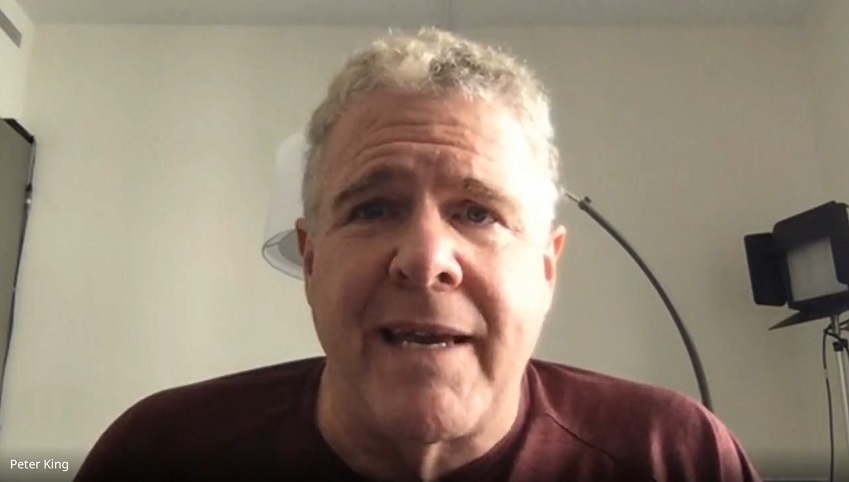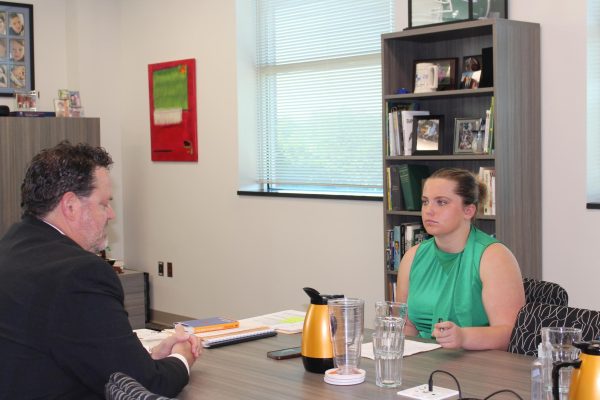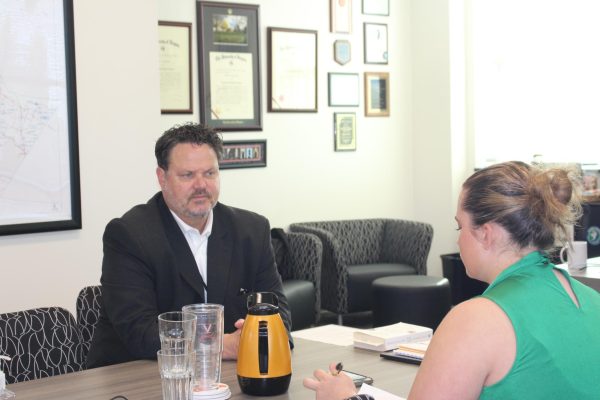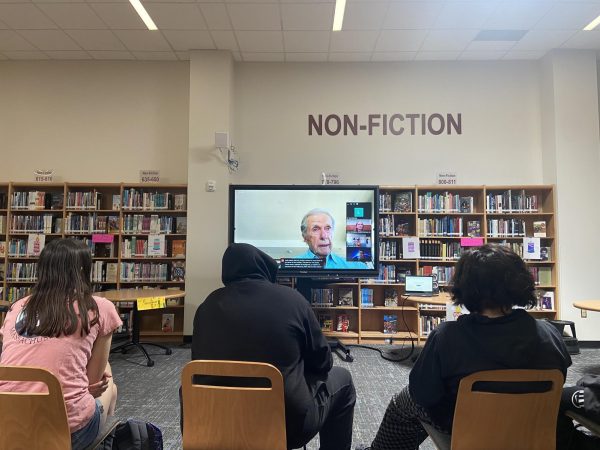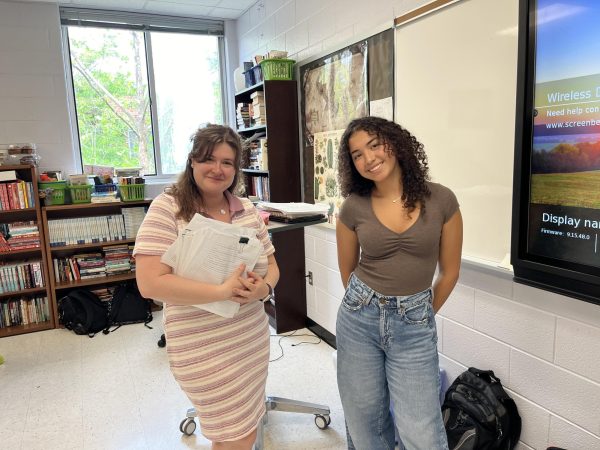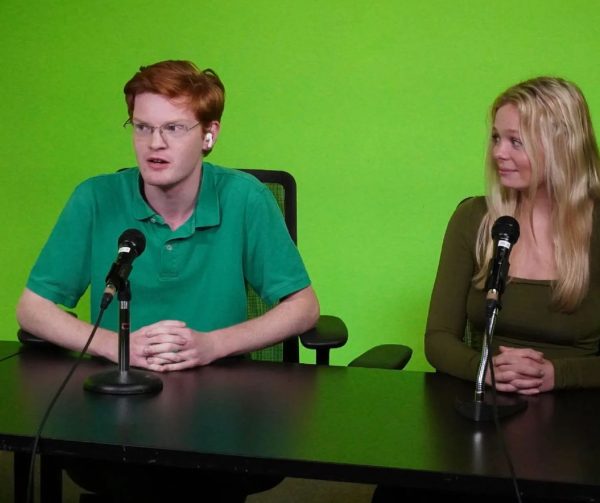Sharing Over 40 Years of Experience, Peter King Visits DHS Press
In a special virtual visit, Peter King spent over an hour taking questions from student journalists.
Sharing stories of his beginnings to modern journalism, Peter King, from Sports Illustrated and now NBC Sports fame, spent over an hour with DHS Press journalists.
Who is Peter King? Perhaps the best way to introduce Peter King is to let him introduce himself. “I’m 63 years old now,” he says. “And a lot of people would think, ‘Well, you can’t teach an old dog new tricks.’ But I would say for about the last six years, I’ve been doing a podcast once a week, I do two regular appearances for NBC on television. I do a 10,000 word column every Monday. And then most often, I’d say 10 to 12 times a week, I do either guest appearances on radio shows, or television shows.”
Despite his busy schedule, King, a three-time National Sportswriter of the Year, joined DHS Press for a special one-hour Q&A on an exclusive Google Meet call, answering students’ questions and sharing stories from his over 40 year career.
Born in Connecticut, King would show a penchant for journalism even in his early years. As he says, he started as young as fifth grade, where his mother would type up stories that he and a friend wrote that he would then distribute in the neighborhood pretending it was his newspaper.
King named a professor at Ohio University, Ralph Izzard, as his mentor. “He basically always had this, this theory that, you know, I mean, this is an old cliche, but there’s never any such thing as a stupid question,” he said. “If you don’t know the answer to something, and you’re sitting there, and you either have to write a story, or you, have to do a broadcast or whatever it is, you have to do you have to try to tell a story somehow, then how are you going to be able to tell that story if you have a question that’s important to the story that you’re afraid to ask? So you have to make sure that every time you have a question, you don’t leave wherever you are, until that question gets answered.”
A lifer in journalism, King recalled the excitement of his early career as a beat reporter for the Cincinnati Reds and Bengals.
“When I was 23 years old, I got a job in Cincinnati,” he explained. “And my job was, I was the backup writer, I was the number two writer for the Reds and the Bengals. And so, I mean, I was going into the locker rooms and seeing, like, really famous people. To me Johnny Bench is one of the greatest catchers of all time, Pete Rose has more hits than anybody ever. All that. I was a little bit honestly, at first, I was a little bit overwhelmed. Because I’m a sports fan.”
However, it wasn’t his fandom of sports that truly caught him. “And so after a while, I just said, nobody’s paying you to be a fan. You know, you’ve got to be a professional.” Instead, what caught him the most was the competition. “So I got to the point. I used to think what made you succeed in college. What made you succeed at Ohio University? And you know what made me succeed? Every day I wanted it to be better than the people who I was competing against. And that is what really motivated me at the end of the day.”
“Because as I say, I don’t care who wins,” he continued. “I really don’t. I root for my story. I don’t root for a team. Honestly, the reason why I wanted the Chiefs to win that game last year is because I knew after the game, that Andy Reid would send everybody away for 15 minutes. And I would sit alone with him in his office, and he would tell me exactly what happened to decide that game. And so I hate to say it, but I was rooting for my story. And so I was kind of rooting for the Chiefs, because I knew my story would be better if the Chiefs won the game.”
King also emphasized the importance of creating good relationships to better a journalist’s writing. He stressed how he always introduced himself to two to three new players on an NFL team every time he visits a training camp or practice.
Throughout the interview, King would also drop pieces of advice for younger journalists and students that want to enter the profession, including questions from DHS Press Alumni who are getting ready to enter the professional journalism world.
“Who I feel terrible for is that a kid, a guy who I’m slightly mentoring goes to the University of Florida. And he had a great internship. That didn’t happen this past summer with the Florida Marlins or the Miami Marlins. He was going to work in their press box and do all this stuff. But he just couldn’t he couldn’t do it because obviously the pandemic,” he said.
“I mean this is probably not going to be what you want to hear,” he continued. ”I think you have to even if you have to work for free. You have to get the experience at either, you know at a local media group. And you get that experience even if you’re not getting paid for it because right now the most important thing in your life is to get reps. But if you can afford to work for free, right now, you should work for free.”
King even dropped his take on the state of journalism today, “The quality of writing, the caliber of writing is declining. And one of the reasons that that happens is that people don’t read as much as they used to. And people do not practice writing as much as they used to. So my advice is, even if you’re not going to be writing, for something that’s going to be published, or something that’s going to be used somewhere, it doesn’t matter. Your only job right now is to get practice at being a good writer.”
In the end, his advice is: “I say, just really practice, practice, practice, what it is you’re doing. And, and, you know, when you, when you get into college, and you start writing in college, you’ll have a head start on everybody who’s there.”

Lilly Cameron is Co-Editor-in-Chief and first began writing for DHS Press in 2020 during her freshman year. She enjoys journalism because it allows her...

Aidan Mason is a second year reporter for DHS Press. He joined DHS Press in order to write something that someone might actually publish. When he's not...



